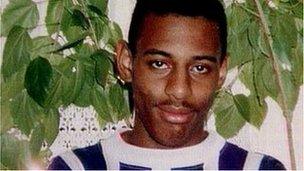Lawrence smear claims 'lack evidence', IPCC says
- Published

Stephen Lawrence was murdered in south-east London in 1993
The police watchdog says it cannot yet investigate claims Stephen Lawrence's family were subject to a smear campaign because of a lack of evidence.
The Independent Police Complaints Commission said while the allegations made by a former officer were "serious" it could not properly assess them.
Peter Francis claims to have posed as an anti-racism campaigner after the murder but has not spoken to the IPCC.
He has previously said he would only speak to a public inquiry.
However, the IPCC says it will investigate former West Yorkshire police chief, Sir Norman Bettison, over allegations he tried to undermine a witness giving evidence to an inquiry into the Lawrence murder investigation.
'Grave misconduct'
Stephen Lawrence was stabbed to death in an unprovoked attack by a gang of white youths as he waited at a bus stop in south-east London in April 1993. In 1999 the Macpherson Inquiry found that the Metropolitan Police were institutionally racist.
Mr Francis, a former undercover officer at Scotland Yard, last month told the Guardian and Channel 4's Dispatches programme that he was told to pose as an anti-racism campaigner in a hunt for "disinformation" to damage the Lawrence family's campaign.
The Metropolitan Police referred the claims to the IPCC, but the watchdog's deputy chairman, Deborah Glass, said they could not be properly assessed at present.
She said Mr Francis had so far refused to talk to Operation Herne, a review of undercover policing being overseen by Derbyshire Chief Constable Mick Creedon.
Ms Glass said: "I have written to Mr Francis to ask if he would be willing to speak to the IPCC. I have not yet had a response, so can only rely on his statements as reported in the Guardian that he is only willing to assist a public inquiry.
"While the allegations are serious, and indicate potential grave misconduct, there is as yet no information or evidence to support them and the fact that the maker of the allegations is unwilling to talk to anyone in a position to investigate them means that their credibility cannot properly be assessed at this stage."
However, the claims of an undercover smear campaign are still being investigated by Mark Ellison QC, at the request of Home Secretary Theresa May. The IPCC said it would wait for the outcome of his report and the separate Operation Herne.
Ms Glass said: "I have determined that the allegations which have been referred do not, at this stage, amount to an indication of recordable conduct. However, I have notified the [Scotland Yard] that if any recordable conduct comes to light in the course of either of the two current inquiries, this must be immediately referred to the IPCC for further consideration."
'Inappropriate and intrusive'
Sir Norman was referred to the IPCC by West Yorkshire Police and Crime Commissioner Mark Burns-Williamson.
He is alleged to have commissioned a report to undermine a witness who was giving evidence to the Macpherson Inquiry in 1998. The witness was appearing in Bradford at a session of the inquiry which aimed to learn more about policing and racism around the country.
Ms Glass said: "From the evidence provided in support of the referral, although there is a suggestion that the reason for carrying out the research was to risk assess the likelihood of any public disorder, the intelligence gathering requested appears to have been both inappropriate and intrusive.
"In the absence of legitimate justification for the research there is an indication of misuse of police information systems and unlawful processing of the witness's (sensitive) personal data by all involved. This would be a clear indication of recordable conduct concerning this tasking.
"This matter therefore requires investigation. The investigation should also consider whether the tasking was motivated or influenced by racial discrimination."
The IPCC decided against investigating referrals from Greater Manchester and South Yorkshire Police, after finding no evidence of any misconduct.
Manchester had alerted the IPCC to a message that said Special Branch wanted information on groups or individuals likely to attend the Macpherson Inquiry, which caused concern in the force at the time.
South Yorkshire had flagged up monitoring of "extreme left wing groups" attending events indirectly linked to the inquiry.
- Published16 July 2013
- Published3 July 2013
- Published3 January 2012